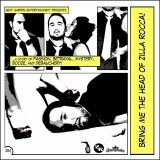About Me

- Name: Charlie
- Location: Brooklyn, NY
The MP3s available here are for sampling purposes. Please support the artists by buying their albums and going to their shows. If you are the artist or label rep and don't want an MP3 featured, let me know. Links will otherwise stay live for about two weeks before they vanish into the ether.
Archives
- May 2006
- June 2006
- July 2006
- August 2006
- September 2006
- October 2006
- November 2006
- December 2006
- January 2007
- February 2007
- March 2007
- April 2007
- May 2007
- June 2007
- July 2007
- August 2007
- September 2007
- October 2007
- November 2007
- December 2007
- January 2008
- February 2008
- March 2008
- April 2008
- May 2008
- June 2008
- July 2008
- August 2008
- September 2008
- October 2008
On My Headphones








On My Screen






On My Shelf




Friday, September 14, 2007
Thursday, September 13, 2007
All lost in the supermarket
Arriving in Singapore, Evan and I had visions of a technologically advanced society of rigid laws and a humming financial industry. Tokyo on a tighter leash. Pristine and safe streets enforced by hefty fines and swings of the cane. But as the taxi screeched up to our hotel at one a.m., a decidedly different version of the city greeted us. A comfortable distance from downtown, seedy Joo Chiat Road featured crowded outdoor cafes and hour-rate hotels. The litter of beer bottles and chips bags clogged gutters and massive roaches scurried past our feet every three yards. (Later, our friend Bridget would inform us, these were referred to as “Asian skateboards.”) And under the wash of neon, gaggles of girls in miniskirts were selling dates from the doorways of karaoke bars. The next morning, we caught the bus down to the business district. Suddenly, here was the setting we’d envisioned, sprawling skyward all around us. Here were branches of world banks dotting the landscape. Here were Ferraris grazing in the parking lots of office towers and British men in suits talking figures in cosmopolitan cafes. It reminded me of lower Manhattan’s ambiance on a weekday, if not nearly as hectic or overrun. There was a sense of order and precision in this downtown, a pace as closely observed and calculable as the rate of the Singaporean dollar. Still, nature has a tendency to disrupt even the most reliable plans. Out of nowhere, a blitzkrieg rain began to fall. This being the rainy season, we weren’t that surprised to get abruptly pelted. But after we took cover in the nearest building, the shower didn’t abate like usual. It didn’t fade to a drizzle in ten minutes; it didn’t dissipate into a refreshing spritz in fifteen. Instead, it just kept hammering the glass ceiling furiously like a drum solo. Forced to adjust accordingly, we started exploring our temporary shelter. It turned out to be a mall, three floors that sprawled out over five whole towers. It felt like we’d inadvertently stumbled onto a subculture. Hundreds (thousands?) of people were congregating in the air-conned shops, trying out products and thumbing through merchandise. A steady stream of newcomers dutifully poured in to replace the few departing. Practically every age group and income level was well represented. Meanwhile, the downpour kept plummeting at full strength for another five hours, but no one seemed to notice. Even after the storm finally broke, there was no mass exodus outside. The shoppers just kept on shopping, their will even more untamable than the rain. But we gratefully took the opportunity to flee for the soaked streets. Since Evan wanted to check out the historically renowned Raffles Hotel, we headed westward. All around, more shopping plazas and megamalls tried to tempt us into deviating. We pressed on before discovering that reaching the Raffles meant navigating underground. Following a staircase and the crowd, we found ourselves led into another mall. Obeying the arrows of overhead signs fed us into another mall and then another. By the third tributary of shops, I started to feel like a lab rat on a test run. It was becoming clear that in Singapore, culture wasn’t a commodity so much as commodity was the culture. The next few days, we explored Chinatown and Little India. Here too were two more facets of Singapore that didn’t mesh with what we’d previously seen. The latter neighborhood was the more interesting of the two, because it more closely approximated the energy of its homeland. Stands of exotic fruits, crates of sundry goods, flower wreaths, and incense sticks cramped the thin strips of sidewalk. Storefronts jutted toward the curb; protruding products edged sloppily into the street. Maneuvering through the throng of Indian shoppers required a dancer’s dexterity. The smells were pungent and unrelenting too, stalking you down the block. Once we traversed that disorder, we needed a respite. Trudging into a muddy field, we watched two teams of shirtless, shoeless boys play a messy game of soccer. They dove for the ball with a reckless joy, a world apart from the rigid grid of downtown. Our greatest discovery though came on our second-to-last day. Wandering around our hostel’s neighborhood, we found an Islamic marketplace. It had about three hundred wall-to-wall food stalls crunched into an open cement edifice, flanked on either side by a Islamic clothing store and a grocery. We were the only tourists there, maybe ever there, attracting many a curious stare. But the offerings available at the stalls were worth crossing cultural lines. Besides, the setup of the cuisines practically invited it—pots of tom yum goong bordered vats of Indian biryanis and Halal stews, which neighbored stalls peddling frog congee. I ended up for a Malaysian shop, which had the longest line and photocopies of glowing praise from local papers. Everything I had there was phenomenal, from the piquant beef rendang to the boiled jackfruit cores to the sambal ikan bilis, a salty and nutty anchovy dish. But because all the stalls specialized in one thing, getting a sugarcane juice meant visiting a stand specifically dedicated to drinks. Getting dessert required locating yet another stand that only did that course. Once we found such a place, I promptly ordered an iced kachang. A typical Singapore finale, it consists of a base of red beans, a hilltop of shaved ice, and a topping of jellied beads and sugary syrups. It was a cool antidote to the hot, muggy air, if sometimes painfully sweet. It also reminded me that shopping in Singapore was a way of life even out here. But only on the outskirts, beyond the realm of guidebooks and fluorescent lighting, did I really feel the pulse of this many-sided city. * MP3: "Lost in the Supermarket" - The Clash from London Calling [Buy it] * Previously: Thank you very much and, for now, siyonara |
Wednesday, September 05, 2007
Tuesday, September 04, 2007
Thank you very much and, for now, siyonara
 It’s four-thirty a.m.; I’m sprawled across a tatami mat in a Tokyo guest room. My friend Evan and my friend’s friend James are five feet away, having a dialogue of snores. Whenever I burp, I can still taste the tangy brown sauce and salty fish flakes of takoyaki. A bottle of lychee-flavored sake’s sloshing around my stomach. I toss again across the narrow futon cover, trying to will my body into sleep. But when that proves pointless, I slide on my headphones instead. I drone “Tokyo” by the Books on repeat, feeling closer to the song than ever. Its fevered energy, its studied loveliness, its conflation of the traditional and the avant have always affected me. In Japan however, it makes a whole new level of sense. Because Tokyo is a strange and complicated city, a foreign place in every sense of the word. When Evan and I walk through James’ neighborhood of Monzen-Nakacho, people inevitably stare. White people are a rarity here, and at six-three, bleached-blonde, and sporting a sleeveless tee, Evan is even more of a sight. The locals are still unfailingly polite, kind almost to a fault. Looking down, they’ll apologize instinctually. The women we’ve encountered are largely as demure as the stereotype suggests. It’s a culture ruled by respect and rooted in gentility. It’s a city where no one locks their bikes and a kind voice reminds subway riders to turn off their cell phones. And yet Tokyo’s also a place with a relentless pulse. Like me, it’s nocturnal; twenty-four-hour stores and ubiquitous vending machines filled with energy drinks and iced coffees light up most streets. Hubs like Shinjuku and Shibuya (home to the world's busiest intersection) bustle with an indiscriminate mix of businessmen, tourists, students and barhoppers. Signs for fast food joints glow with ads for fried shrimp burgers and aloe shakes. Headache-inducing chaos thunders out of pachinko parlors, where manic machines try to outscream each other. In the younger version of the parlor, the arcade, teenagers congregate under thickets of smoke. They try to snag painfully cute stuffed animals between the claws of UFO catchers. They unleash breathless rounds of artillery and explode planets in row after row of video game consoles. Tokyo, it must be noted, is also a temple of food. As indelibly linked to its eats as New York or Rome or Paris, the city has a staggering quantity of restaurants. Many of the options are modest, offering comfort foods like udon soups and tonkatsu. (In keeping with the love of technology, these places often have automated push-button ordering instead of waiters.) However, the Japanese take their meals seriously too, even with the classics. When Evan and I visited the top-ranked ramen shop in Tokyo, an eight-seat corridor hidden on a back alley in a low-key neighborhood, the line was an hour long. When we visited the famous Tsujiki market, where fishmongers unpacked enormous heaps of fresh and frozen seafood at five a.m., sushi purveyors were already shopping for their daily supply. At six-thirty a.m., two blocks away, we were already eating horse sashimi, mantis shrimp, disk abalone and other exotic cuts I’d never encountered. A few days before, that idea would’ve seemed weird, but in Tokyo, it just felt like natural worship. I’ve never felt as much like an outsider anywhere outside of Tokyo’s unyielding streets. Without any grasp of the language, reduced to pointing randomly at menus, adrift in the subterranean tunnels of malls and stations, I never forget my alien status here. I’m permanently an observer and a tourist, on the high-speed fringes of a society that’s still deeply adapting to changing times. It’s a refreshing deviation from my usual life, where everything feels like a given. Eventually, around the fifteenth time “Tokyo” rolls around, I admit I’m too wired to sleep. Leaving behind the music and the cappuccino-maker snores, I head onto the balcony. I survey the outskirts of the city at dawn, the sky the shade of a blue still gaining courage. Across an ocean, I’ve seen this moment a thousand times, but here in Tokyo, it feels like the city itself—close but distant, humble but awing, as old as history but also brand new. * MP3: "Tokyo" - The Books from The Lemon of Pink [Buy it] |















